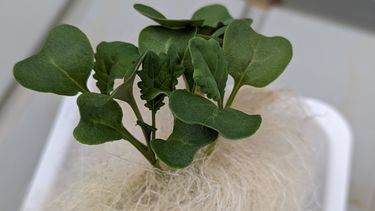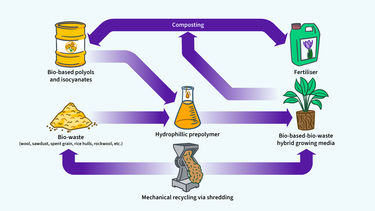- The University of Sheffield project will develop new environmentally-friendly and peat-free growing materials, or media from bio-waste
- Research will create a system to make growing media of consistent quality
- Researchers will assess how new growing media will biodegrade to ensure they can be used sustainably and recycled more easily than current solutions
- Using bio-waste from brewing, wood, wool, and clothing industries will help reduce environmental impact
- Controlled farming has grown in popularity in recent years due to the control it provides over resources such as water, energy, and space
New environmentally-friendly growing media made from waste materials will be developed by researchers at the University of Sheffield’s Institute for Sustainable Food, for use when growing crops in controlled environments.
The project, WHyGro-in-Me (Waste-based Hybrid Growing Media), will address the challenge of reducing environmental impacts of crop production in controlled environments, whilst sustainably increasing crop yield.
The research is being funded by a £900k grant from the UKRI’s Biotechnology and Biological Sciences Research Council (BBSRC), which is being 80 per cent matched by industry partners.
As farming continues to face multiple environmental challenges, Protected and Controlled Environment (PACE) production has grown in popularity due to the control it provides over resources such as water, energy, and space. Growing in this way requires a growing media - the material used to grow plants in and demand for these materials is predicted to grow rapidly by 420 per cent by 2050.
Conventional growing media used in PACE production often end up in landfill after use due to how difficult it is to recycle them. Some of these media also often contain a large amount of peat and as the industry looks to ‘de-peat’ due to sustainability concerns, growers are looking for alternatives.
Alternatives include growing media that use bio-waste based fillers from parallel industries to food production (sawdust, wood fibres, spent grain, sheep wool, cotton fabric, end of life rockwool etc).
Dr Harry Wright, from the University of Sheffield’s Department of Chemistry and Institute for Sustainable Food, said: “These components can be more sustainable than finite resources such as peat, but suffer from variability in terms of physical and chemical properties due to their organic nature and where they’re sourced from. This leads to variability in the growth of crops, which can affect quality and yield.
“So our project is looking to address this by homogenising and binding the growing media together using novel bio-based and biodegradable polyurethane prepolymers (bPUP). This versatile polymer will act as a ‘glue’ to help bind the growing media and make it more consistent and we will conduct trials using the new media on crops such as tomatoes, basil and lettuce to test both the initial germination and final yield.”
Initial crop growth trials will be completed at the University of Sheffield, while one of the project's industrial partners, Intelligent Growth Solutions (IGS), will conduct industrial trials using their state-of-the-art vertical farm technology. These trials will help to determine the viability of any proposed growing media.
Dr. Mike Murray, Chief Technical Officer of the Vita Group, the project’s industrial partner who will supply bPUP precursors and bPUP for testing, said: “Collaboration is the key to addressing the real environmental impacts in our world and in this project we are bringing together world leaders on bio-based technology and sustainability to address the challenges in the horticultural industry. This project aims to make a step change in the environmental impact and footprint of the industry and drive lasting and measurable change.”
Researchers will then explore how each media can be processed once it has been used, trialling methods such as biodegradation, composting and mechanical recycling.
The project aims to generate significant scientific advancement by developing novel polyurethane prepolymers (PUPs), as well as crop and system specific ‘media recipes’ for PACE horticulture.
Dr Wright added: “Using bio-waste from industries such as brewing, wood, and clothing will also have the added benefit of allowing businesses to write off the materials against their Life Cycle Analysis, helping to reduce their environmental impact.
“We hope the project can help establish the UK as an area of expertise in growing media development.”


